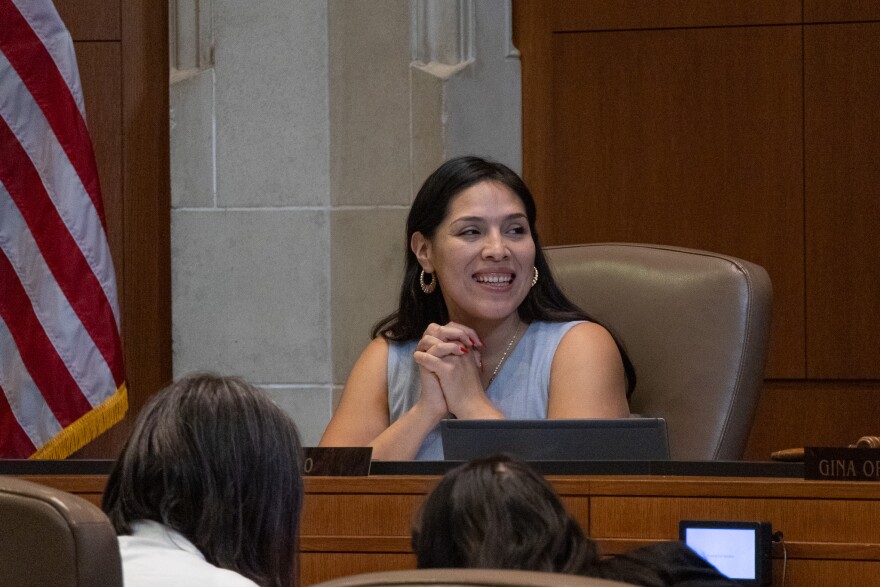Sign up for TPR Today, Texas Public Radio's newsletter that brings our top stories to your inbox each morning.
Three of the more than 830 new laws that went into effect in Texas on Monday aim to lower Texas’ housing costs and increase housing supply. All three measures loosen zoning and land use regulation and offer developers an easier path to building housing. But not everyone is convinced they’ll have the big impact lawmakers say they will.
Earlier this year, Gov. Greg Abbott told Texas lawmakers they needed to address rising housing costs. And now, he seems pretty happy with the results.
“This session, Texas did more than any state in America to make housing more affordable,” Abbott said at an August signing ceremony for the three new laws, Senate Bill 840, Senate Bill 15, and House Bill 24. “Sweeping reforms to ensure housing is more affordable and quicker to construct in the state of Texas are now law.”
Many developers, like San Antonio-based OCI Development partner and co-founder Anita Fernandez, said they are happy to take whatever help they can get.
“Now more than ever, we need all the tools available to us to be able to continue to try to make a positive impact in creating more affordable housing for our city, for our state and for our country,” she said.
But there are several reasons the new laws may not have the impact the governor has claimed.
“Rents are dropping in a lot of places,” UT Austin Professor of Community Regional Planning Jacob Wegmann said. “And tons of apartments have gotten built recently, and interest rates are high, and construction labor is still expensive.”
All these factors, Wegmann said, make building new housing difficult in Texas. And the deregulation these new measures provide aren’t enough to overcome them.
He said Texas won’t see a big spike in housing supply until the overall economic environment has improved.
Two of the new laws Abbott signed change zoning regulations.
Senate Bill 840 allows developers to build multifamily housing on any land zoned for office, retail, or warehouse development, without the need for a zoning change.
Proponents like Texas Affiliation of Affordable Housing Providers President Roger Arriaga said the bill will give developers more opportunities to build housing.
“We're hoping the market will take full advantage and build into those areas and thereby relieve some of the price pressures that we're seeing across the board,” Arriaga said.
Local elected officials in San Antonio and Austin said they were concerned that the law would have unintended consequences.
If developers build dense housing in areas without adequate street infrastructure, for example, traffic safety and congestion could worsen.
“While these are great in terms of density, more affordable housing, we need to be mindful of placement of these properties, and we're not putting folks in dangerous driving situations to get home,” said San Antonio City Councilmember Teri Castillo.

Austin City Councilmember Zo Qadri said it might work against Austin’s existing density bonus program, where developers are allowed to build higher density developments if they agree to make some portion of the development’s units below-market, or affordable.
“By overriding local rules on density, height, and parking, it could extend far beyond what lawmakers envisioned and weaken programs we rely on to deliver affordable housing,” Qadri said in a statement.
House Bill 24 reforms the so-called “tyrant’s veto” and makes it more difficult for property owners near a newly planned development to torpedo zoning changes.
Before, if enough nearby property owners signed a petition, the local city council would need a supermajority vote to approve a zoning change.
Pedcor Investments’ Vice President of Development Jean Latsha said these zoning battles are a major hurdle.
“That's a significant amount of effort, time and money that, if you take that away, then, yeah, that site becomes much more attractive to all sorts of developers,” she said.
If the law had been around last year, San Antonio would not have lost tens of millions of dollars in tax credits for a North Side affordable housing project after the San Antonio City Council failed to approve a zoning change with a supermajority.
Because these zoning changes come up frequently in cities across Texas, HB 24 is the law that Texans should feel the effects of soonest.
The two laws will have a minimal impact on Houston, which does not have zoning.
The final bill in the trio is Senate Bill 15.
It allows for higher density single-family housing development on 5-acre-or-greater plots of land in large cities.
Those plots are usually located on the outskirts of cities, so experts said it’ll likely have the narrowest impact of the three new laws.
The Texas legislature has a lot more work ahead of it if it wants to expand the state’s supply of affordable housing, according to Texas Housers research director Ben Martin.
“The legislature is pretty clearly looking for solutions to the housing crisis that don't cost any money,” Martin said. “Unfortunately, if you want to make housing affordable, especially for the people who have the most unstable housing and are at the highest risk of falling into homelessness, it is going to cost money.”
For now, communities across Texas will just have to see how — and how much — developers begin taking advantage of their new regulatory environment.





